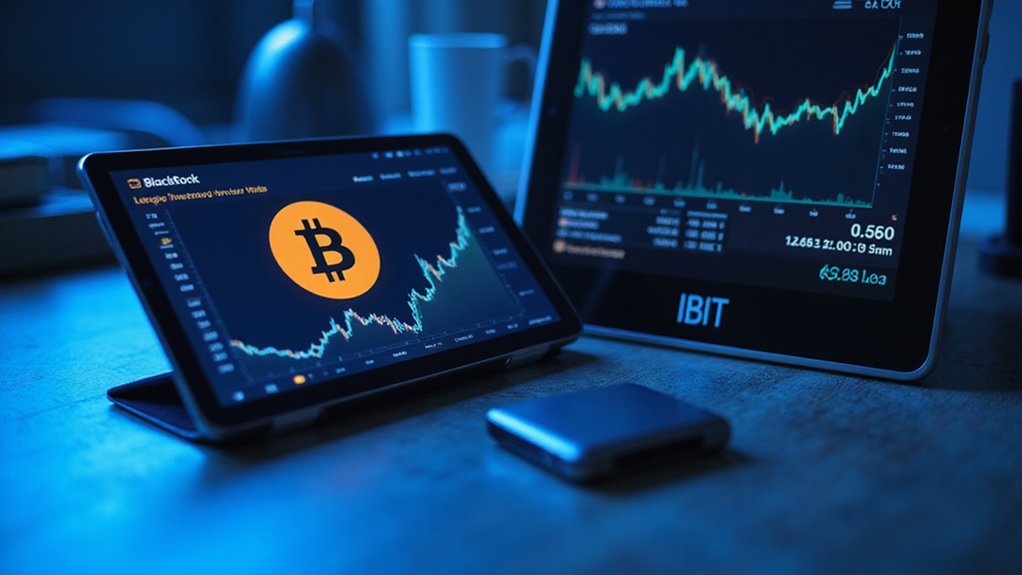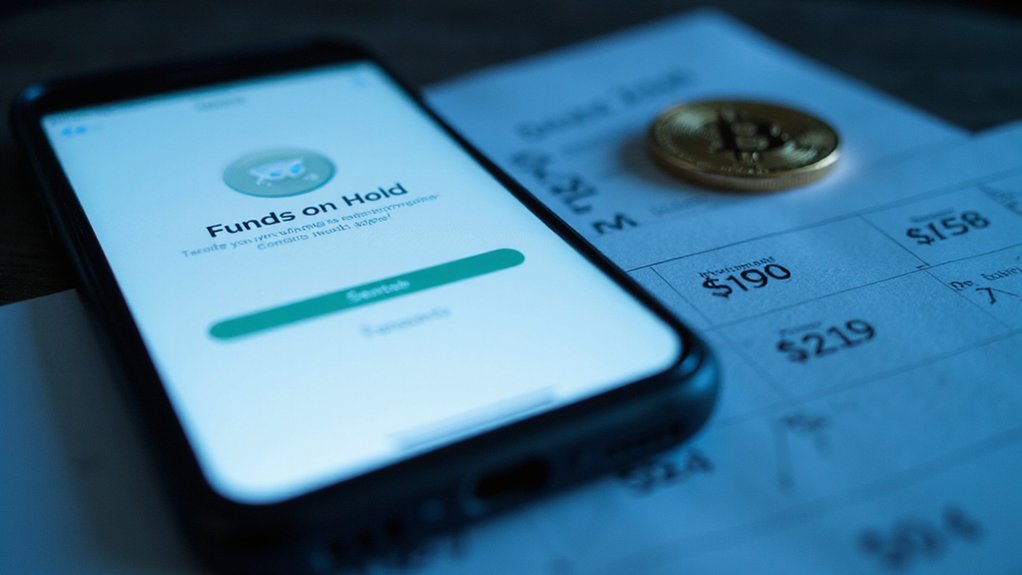IBIT (iShares Bitcoin Trust) is BlackRock’s SEC-approved spot Bitcoin ETF that trades on NASDAQ under conventional market hours. Launched January 2024 by the $9.4 trillion asset manager, it offers cryptocurrency exposure without self-custody complications. The fund directly holds Bitcoin with institutional-grade security, charges a competitive 0.25% management fee, and employs standard ETF creation-redemption mechanics. Its approval marked a watershed moment for cryptocurrency legitimacy in traditional finance circles. The implications extend far beyond mere trading convenience.

Precisely when traditional financial markets seemed determined to maintain their aloof distance from cryptocurrencies, BlackRock—the world’s largest asset manager overseeing a staggering $9.4 trillion—launched IBIT, the iShares Bitcoin Trust. This SEC-approved financial product (as of January 2024) represents a watershed moment in cryptocurrency’s journey toward mainstream acceptance, offering investors exposure to Bitcoin’s price movements through a familiar exchange-traded vehicle rather than traversing the labyrinthine world of digital wallets and private keys.
BlackRock’s IBIT heralds cryptocurrency’s arrival in mainstream finance, bypassing digital complexities for traditional investment pathways.
IBIT trades on NASDAQ under its eponymous ticker, providing liquidity during standard market hours—a stark contrast to cryptocurrency’s relentless 24/7 trading cycle. The trust directly holds Bitcoin in institutional-grade custody arrangements, with daily disclosures of holdings providing transparency rarely found in crypto markets. IBIT exemplifies the spot-based ETF approach that directly tracks cryptocurrency performance. For this service, BlackRock charges a relatively modest 0.25% management fee, positioning IBIT competitively against other crypto-focused investment vehicles.
The operational mechanics behind IBIT follow established ETF protocols: authorized participants facilitate the creation and redemption of shares, ensuring the fund’s price remains tethered to Bitcoin’s actual market value. This mechanism, while invisible to most investors, represents the sophisticated plumbing that allows traditional brokerage accounts to gain cryptocurrency exposure without directly interacting with blockchain technology. It’s worth noting that IBIT is one of several meanings for this acronym, with Information Technology representing 4 of the 10 total definitions found in comprehensive abbreviation databases. The fund also incorporates sophisticated built-in test functions similar to those found in advanced electronic test equipment.
IBIT’s audience spans the financial spectrum—from institutional heavyweights like pension funds seeking diversification to retail investors dipping cautious toes into cryptocurrency waters without confronting the technical complexities of self-custody. Financial advisors, meanwhile, gain a regulation-compliant tool for client portfolios.
This investment vehicle isn’t without risks, of course. Bitcoin’s notorious volatility remains intact regardless of the wrapper it comes in, and regulatory attitudes toward cryptocurrency remain mercurial at best. Potential tracking errors and counterparty risks also warrant consideration. Yet IBIT represents something perhaps more significant than its investment merits alone—the moment when traditional finance and cryptocurrency’s parallel universes began their tentative convergence, with BlackRock of all entities serving as the unlikely bridge between worlds.
Frequently Asked Questions
How Does IBIT Compare to Traditional ETFS?
Unlike traditional ETFs that typically track indexes or baskets of securities, IBIT offers direct exposure to Bitcoin’s price movements through a trust structure. This cryptocurrency-focused investment exhibits substantially higher volatility than conventional ETFs, providing portfolio diversification that traditional offerings can’t match. While IBIT maintains regulatory oversight and exchange listing similar to traditional ETFs, its cryptocurrency underpinnings introduce unique considerations regarding security, custodianship, and risk profile that investors won’t encounter in standard index-tracking vehicles.
What Are the Tax Implications of Investing in IBIT?
IBIT investors face standard property-based taxation, with transactions triggering capital gains rather than any holding tax (that small mercy!).
Gains follow the familiar short/long-term dichotomy, with the latter’s preferential rates incentivizing patience beyond the one-year threshold.
Unlike certain investment vehicles, IBIT mercifully spares owners from K-1 form complexities.
Tax-efficiency strategies include retirement account utilization and strategic tax-loss harvesting—though these Bitcoin-adjacent investments often create tax situations complex enough to warrant professional guidance.
Can IBIT Be Included in Retirement Accounts?
IBIT can indeed be incorporated into certain retirement accounts, though the landscape remains somewhat nuanced.
Traditional IRAs and 401(k)s may offer IBIT access through brokerage windows, while self-directed IRAs provide more flexibility for such alternative investments.
The ETF structure conveniently sidesteps many regulatory hurdles that direct cryptocurrency holdings would face.
Investors should verify specific plan allowances, as institutional adoption continues to evolve (and financial gatekeepers reluctantly adapt to digital asset realities).
What Is the Minimum Investment Required for IBIT?
The minimum investment required for IBIT is simply the price of a single share—currently trading at roughly 1/1800th of bitcoin’s spot price.
Unlike traditional funds with established minimums, this spot Bitcoin ETP can be purchased in single-share increments (or even fractional shares through certain brokers).
While brokerage-specific fees and platform minimums may apply, the remarkably low 0.12% expense ratio makes IBIT particularly accessible to investors seeking bitcoin exposure without the custody complexities.
How Does Bitcoin Price Volatility Affect IBIT Performance?
Bitcoin price volatility directly impacts IBIT performance since the ETF tracks Bitcoin’s spot price with 1:1 exposure.
When Bitcoin experiences dramatic swings (those hair-raising plunges or euphoria-inducing rallies), IBIT’s NAV follows suit with mathematical precision.
Unlike some financial instruments that might dampen volatility through derivatives or hedging, IBIT offers unvarnished Bitcoin exposure—though institutional participation and BlackRock’s arbitrage mechanisms may somewhat temper the wild oscillations characteristic of crypto exchanges operating in regulatory hinterlands.









